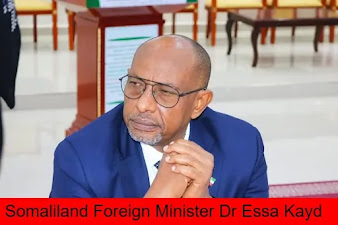T
he
Diplomatic Evolution of Somaliland: Initiating Legal Action Against Somalia in
the International Court of Justice
In the
intricate geopolitical landscape of the Horn of Africa, one entity stands out
with a unique diplomatic trajectory: Somaliland. Despite not being
internationally recognized as an autonomous state, Somaliland has skillfully
navigated the complex world of diplomacy, carving out its place on the global
stage. This article delves into Somaliland's diplomatic journey, highlighting
its successes, obstacles, and prospects.
Historical
Background Somaliland declared independence in 1991 after the collapse of
Somalia's central government, setting itself apart from its turbulent neighbor.
As a de facto sovereign entity, Somaliland has built functional institutions,
governance structures, and a security apparatus. Despite maintaining relative
stability and peace, Somaliland faces the challenge of lacking international
recognition, which hinders its participation in global diplomacy.
Diplomatic
Achievements Despite its unrecognized status, Somaliland has achieved
significant diplomatic progress. Through pragmatism, adaptability, and
resilience, Somaliland has established strong bilateral relationships with
countries such as Ethiopia, Djibouti, Kenya, and the United Arab Emirates.
These diplomatic ties have led to economic growth, improved security
cooperation, and enhanced regional integration.
Furthermore,
Somaliland has actively engaged in international forums and collaborated with
multilateral organizations, demonstrating its commitment to global
partnerships. Notable engagements include the London Somalia and Somaliland
Talks Conference and the Gulf of Aden Security Conference, where Somaliland has
advocated for its interests and sought alliances to address common challenges
like piracy and terrorism.
Somaliland's
effective management of its maritime resources highlights its diplomatic
prowess. Despite the lack of international recognition, Somaliland has secured
agreements with foreign entities for the exploration and exploitation of
offshore oil and gas reserves. These collaborations have not only boosted
Somaliland's economy but also solidified its reputation as a reliable regional
partner.
However,
despite these diplomatic successes, Somaliland faces significant challenges on
its diplomatic journey. The primary obstacle is the lack of formal recognition
by the international community, which hinders access to diplomatic channels,
financial aid, and foreign investment.
Nevertheless,
Somaliland remains optimistic about its diplomatic future. By leveraging its
strategic location, stable governance, and growing economy, Somaliland
continues to attract foreign investment and build partnerships with like-minded
states and organizations. The vibrant Somaliland diaspora also plays a crucial
role in promoting its interests abroad and advocating for international
recognition.
Looking
ahead, Somaliland aims to enhance its diplomatic efforts, diversify its
international partnerships, and strengthen engagement with regional and global
stakeholders. By capitalizing on emerging geopolitical trends in the Red Sea
and the Horn of Africa, Somaliland seeks to elevate its diplomatic status and
advance its quest for recognition.
The Ongoing
Diplomatic Dispute: Somaliland's Legal Maneuverings The protracted diplomatic
dispute between Somaliland and Somalia traces its roots to historical
grievances regarding sovereignty and territorial integrity. Since declaring
independence in 1991, Somaliland has functioned as a de facto independent
state, complete with its government, military, and currency. However,
international recognition has remained elusive.
Somalia
adamantly rejects Somaliland's independence, asserting its claim over the
territory as an integral part of its sovereign domain. This fundamental
divergence has fueled diplomatic tensions and sporadic confrontations between
the two entities.
Recent years
have witnessed Somaliland intensifying efforts to secure international
recognition. These efforts encompass diplomatic engagements with various
countries and regional bodies, alongside active participation in international
fora. A significant development was the signing of a memorandum of
understanding (MOU) with Ethiopia, aimed at fostering cooperation across
multiple sectors. However, Somalia vehemently opposed this MOU, perceiving it
as a threat to its territorial integrity.
Dr. Essa,
Somaliland's Foreign Minister, has played a pivotal role in spearheading the
country's diplomatic initiatives. His recent diplomatic missions to France and
the UK aimed to garner support for Somaliland's recognition as an independent
state, thereby amplifying its case on the global stage.
In response,
Somalia has vehemently opposed Somaliland's pursuit of recognition, rallying
international support through diplomatic channels. but it does not prevent from
proceeding; the mission
Despite
efforts to resolve the dispute, progress has been slow due to entrenched
positions on both sides. International mediation and dialogue are being
considered as potential solutions, with the recent Memorandum of Understanding
(MOU) between Ethiopia and Somaliland highlighting the importance of regional
actors in facilitating reconciliation.
However,
Somaliland's Foreign Minister, Dr. Essa Kayid, recently suggested the
possibility of seeking legal action through international channels, such as the
International Court of Justice (ICJ). While this could provide a framework for
peaceful resolution, uncertainties remain as both Somaliland and Somalia
continue to assert their claims.
The ongoing
diplomatic dispute highlights the complexity of the region's political
landscape and the challenges of achieving lasting peace and stability. It is
crucial to closely monitor developments as they unfold.
This
comprehensive discussion delves into the multifaceted nature of Somaliland's
diplomatic journey, including its successes and ongoing obstacles. It also
explores the intricacies of its dispute with Somalia and the potential for
resolution through international legal mechanisms


Comments
Post a Comment